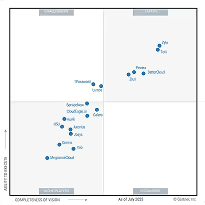HIPAA Compliance Checklist for 2025

Over 70% of small to mid-sized businesses now rely on Managed Service Providers (MSPs) to handle their IT operations, cybersecurity, and software management. But with increasing demands and complex client environments, MSPs can no longer afford to rely on manual processes or disconnected tools.
That’s where Managed Service Provider (MSP) software comes into play. These platforms empower MSPs to automate IT tasks, monitor infrastructure in real-time, secure client environments, and deliver consistent service quality at scale.
In this blog, we’ll explore the 10 best managed service provider software options on the market, covering their key features, pros and cons, pricing, and use cases to help you find the right tool for your MSP business.
TL;DR
- Managed Service Provider (MSP) software enables IT teams to manage clients’ infrastructure, networks, security, and endpoints efficiently.
- MSP tools drive automation, cost optimization, compliance, and real-time issue resolution.
- Businesses using MSP platforms benefit from improved operational efficiency and customer satisfaction.
- This blog lists the top 10 MSP software based on features, pros, cons, and pricing.
- CloudEagle.ai is highlighted as a key enabler for SaaS management and IT optimization for MSPs.
What is Managed Service Provider Software?
MSP software refers to Managed Service Provider software, a suite of tools used by companies that provide IT services to other businesses. These tools help MSPs remotely monitor, manage, and maintain their clients' IT infrastructure, including cloud efficiency, and endpoints. Essentially, MSP software enables proactive, efficient, and scalable IT service delivery.
Also known as managed services provider software, this technology forms the backbone of managed IT services, helping MSPs scale operations efficiently and deliver top-tier services to clients.
Why Do Businesses Need Managed Service Provider Tools?
Businesses utilize MSP (Managed Service Provider) tools to streamline IT operations, enhance security, improve cost-effectiveness, and focus on core business activities. MSP tools automate tasks, offer remote monitoring and management, and provide access to expertise, all contributing to greater efficiency and reduced downtime.
They also help businesses manage security, compliance, and scalability needs, especially as they grow or face seasonal fluctuations.
Improved Operational Efficiency
MSP tools streamline IT operations by automating routine tasks like patch management, ticketing, system monitoring, and software deployment. This reduces the workload on IT staff while increasing task accuracy and speed.
Enhanced Security and Compliance
MSPs must safeguard sensitive client data while meeting IT compliance requirements such as GDPR, HIPAA, or SOC 2. Top managed services software offers features like automated vulnerability scanning, endpoint protection, and compliance reporting.
Cost Optimization
By consolidating tools and automating services, MSP software helps reduce overhead, improve resource allocation, and lower total cost of ownership for clients and providers.
Better Customer Support and Satisfaction
Modern best MSP tools include built-in helpdesk ticketing systems, chat, SLAs, and reporting capabilities to ensure faster response times and transparent client communications.
Proactive Monitoring and Issue Resolution
Real-time alerts and AI-driven monitoring allow MSPs to detect, diagnose, and resolve issues before they escalate, improving service uptime and reliability.
Challenges Faced Without Managed Service Provider Tools
Without Managed Service Provider (MSP) tools, organizations face challenges like fragmented data, difficulty scaling, inadequate cybersecurity, and poor customer service.
These issues can lead to inefficiencies, security vulnerabilities, and ultimately, hinder business growth and success.
Manual Workload and Errors
Relying on manual methods to monitor systems, track tickets, or deploy updates introduces room for human error and inefficiency.
Limited Visibility into IT Infrastructure
Without a unified dashboard or platform, MSPs lack a holistic view of clients’ infrastructure, leading to delayed troubleshooting and suboptimal decisions.
Higher Security and Compliance Risks
In the absence of automated security protocols and compliance checks, businesses are more vulnerable to data breaches and fines.
Difficulty Managing Multiple Clients
As an MSP scales, managing multiple clients with different infrastructure needs becomes increasingly complex without a robust managed services software solution.
10 Best Managed Service Provider Software
Here's a list of 10 popular and highly-regarded Managed Service Provider (MSP) software solutions:
1. CloudEagle.ai
CloudEagle.ai is a modern SaaS governance and optimization platform built specifically to help MSPs manage sprawling SaaS environments at scale. Its AI-powered engine automates app discovery, spend analysis, license right-sizing, and risk detection — enabling MSPs to deliver proactive, value-added services to their clients while drastically cutting costs and effort
Why CloudEagle for MSPs?
CloudEagle.ai isn’t just a SaaS management tool, it’s an AI-powered SaaS governance and procurement platform that enables MSPs to deliver higher-value services to clients while cutting software costs by up to 30%.
Key Capabilities Built for MSP Use Cases:
SaaS Discovery & License Optimization
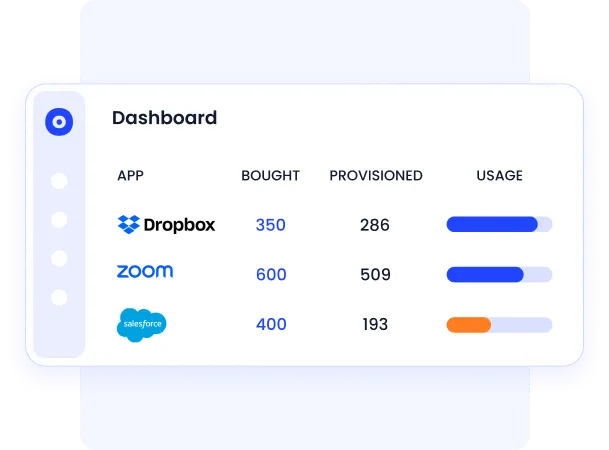
- 500+ prebuilt integrations discover every active tool across environments, even those outside SSO.
- AI maps logins, usage, and spend data to flag unused or duplicate apps, saving immediate costs.
- Smart license harvesting and reallocation ensures every seat delivers ROI.
Centralized Vendor & Contract Management

- An AI-powered repository automatically extracts metadata like renewal terms, SKUs, and notice periods.
- Manages contracts across all client accounts, simplifying negotiations and eliminating renewal surprises.
- Leverages price benchmarking insights to secure best-in-class vendor pricing.
Automated Workflows
- Set up zero-touch provisioning and deprovisioning for new hires and exits, across all client tenants.
- Custom workflow automations for access requests, renewals, and procurement approvals.
- Works even for apps not connected to Okta or other IDPs.
Real-Time Spend Intelligence
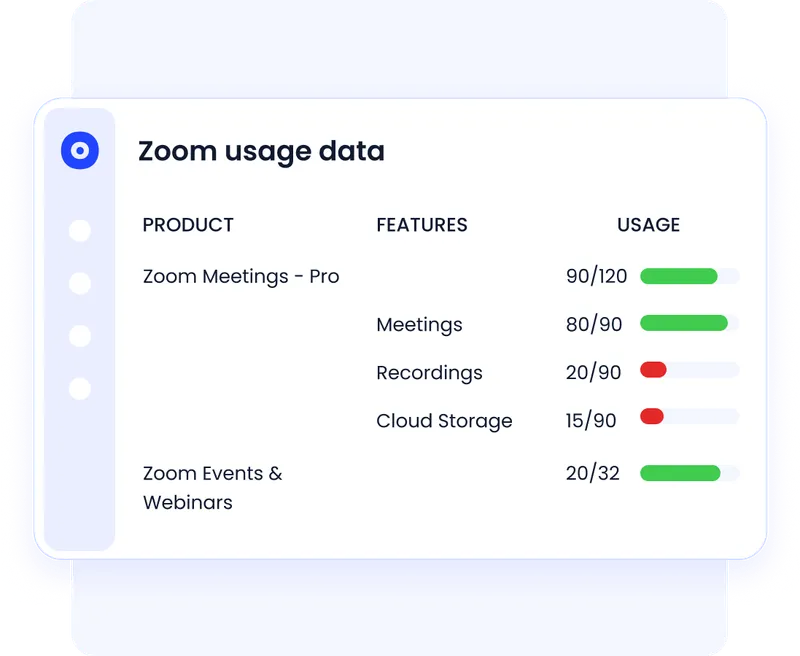
- Unified dashboards show spend by vendor, department, or user, enabling MSPs to provide tailored reporting to each client.
- Surface billing anomalies and shadow IT through integrations with finance systems.
Compliance & Risk Governance

- Automates access reviews, detects overprivileged users, and supports SOC 2/GDPR readiness.
- Built-in Shadow IT monitoring flags unsanctioned SaaS or AI tools across departments.
Designed for Scale

- Multi-tenant architecture supports MSPs with 10 or 100 clients effortlessly.
- Fastest onboarding in the industry, 30 minutes to value with no manual setup.
Pros
✅ Purpose-built for MSPs with multi-tenant management, fast onboarding, and centralized visibility.
✅ Drives 10–30% cost savings for clients through optimization, consolidation, and vendor benchmarking.
✅ Automates provisioning, deprovisioning, license harvesting, and compliance reviews across client accounts.
Cons
❌ Primarily focused on SaaS; may not support legacy or on-premise asset management needs.
❌ Full feature access may require deeper integration setup with finance or HR systems for best results.
Pricing
- SaaS Management module starts at $2,500/month – includes license tracking, usage monitoring, renewals, and budgeting.
- SaaS Governance module starts at $2,000/month – covers onboarding/offboarding, access controls, and compliance workflows.
- SaaS Procurement module starts at $2,500/month – offers vendor negotiation support, price benchmarking, and procurement automation.
Bundle options:
- Management + Governance: $4,500/month
- Management + Procurement: $5,000/month
- Full suite (Governance + Management + Procurement): $7,000/month
Free trial available; onboarding support included in packages. Designed for mid-to-large enterprises with scalable, modular pricing.
2. NinjaOne
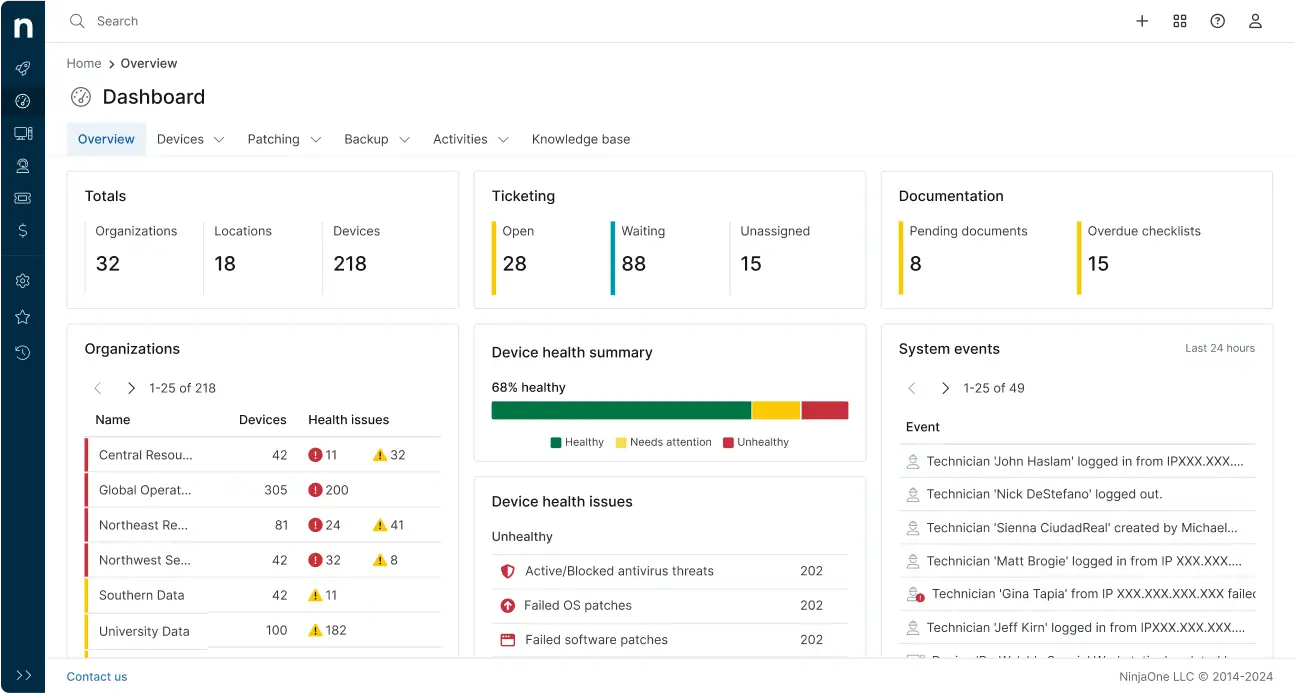
NinjaOne is a cloud-based IT management platform built for Managed Service Providers (MSPs) and internal IT teams seeking simplicity, speed, and scalability. It provides centralized visibility and control over endpoints, networks, and users—without the overhead of complex configurations. The platform stands out for its rapid onboarding process and powerful automation tools.
Features
- NinjaOne delivers real-time remote monitoring and management (RMM), enabling IT teams to proactively address issues before they escalate.
- Its automated patch management works seamlessly across Windows, macOS, and Linux, helping teams stay secure and compliant.
- The platform also includes built-in backup and recovery solutions for endpoints, ensuring business continuity with minimal manual effort.
Pros
- The interface is clean and intuitive, allowing for fast adoption by both experienced technicians and new users.
- Powerful automation and reporting tools save time and reduce repetitive tasks across IT environments.
- NinjaOne is backed by responsive customer support and well-documented resources, which enhances the onboarding and troubleshooting experience.
Cons
- The platform offers limited PSA (Professional Services Automation) capabilities, such as ticketing and billing, compared to full-service alternatives.
Integration options are fewer than some legacy RMM tools, which may restrict extensibility for larger ecosystems. - Currently, there is no native mobile app available, which can be a drawback for technicians needing access while in the field.
Pricing:
NinjaOne offers custom pricing based on the number of endpoints and services required. You need to contact their sales team for a tailored quote, but it’s known for transparent pricing without hidden fees.
3. Atera Networks
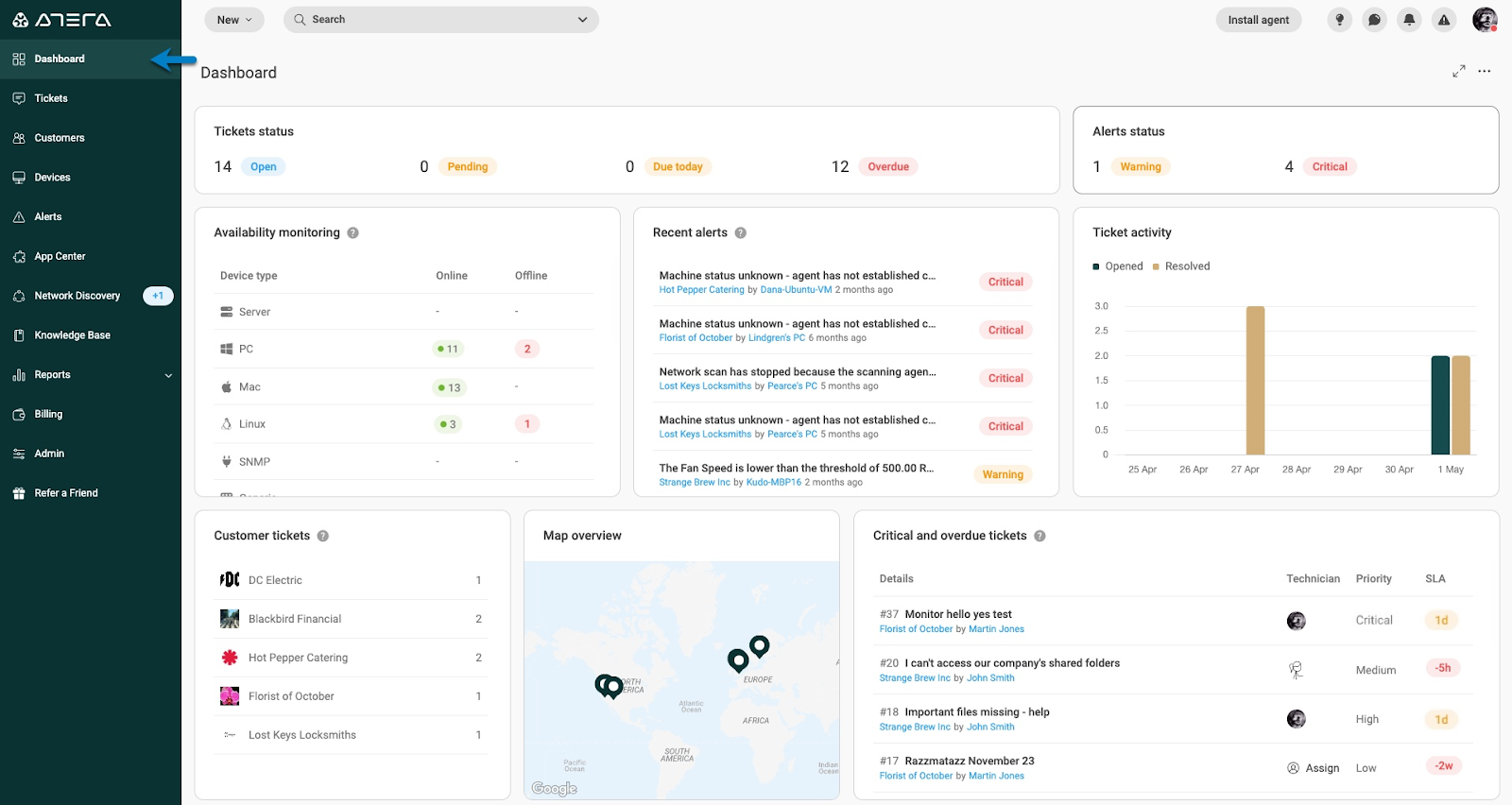
Atera is an all-in-one platform built for Managed Service Providers (MSPs), combining Remote Monitoring and Management (RMM), Professional Services Automation (PSA), and remote support in a single solution. Tailored especially for small to mid-sized MSPs, Atera is designed to simplify IT operations while supporting business growth. Its straightforward pricing model makes it highly attractive for teams looking to scale without unpredictable costs.
Features
- Atera offers unlimited endpoint management per technician at a fixed price, allowing teams to scale efficiently without increasing overhead.
- The platform includes integrated helpdesk, billing, and ticket automation, streamlining service delivery and reducing administrative burden.
- Real-time device monitoring is supported with built-in patching and customizable scripting, giving technicians control over maintenance and security.
Pros
- Its per-technician pricing ensures cost predictability, especially valuable for growing MSPs managing many endpoints.
- The user-friendly interface and quick setup make onboarding smooth, even for non-technical users.
- Built-in remote access via AnyDesk and Splashtop allows seamless troubleshooting and support without third-party tools.
Cons
- The feature set may not meet the needs of larger or more complex MSPs requiring advanced configurations and integrations.
- Reporting and analytics tools are relatively basic and lack deep customization options.
- Automation rules exist but are somewhat limited in complexity, which may restrict advanced workflow creation.
Pricing
Atera uses a per-technician pricing model starting at around $129/month per technician (Essentials plan), with higher-tier plans offering expanded features. There are no additional fees for endpoint volume, making it cost-effective for managing a large client base.
4. ConnectWise
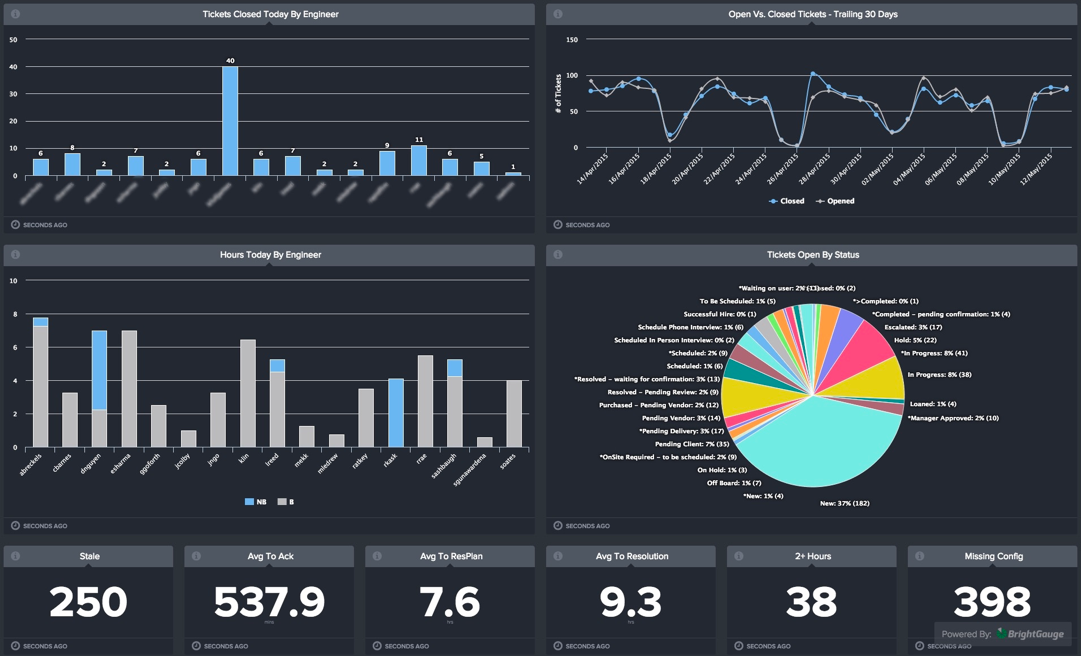
ConnectWise Manage is a comprehensive IT service management solution tailored for mature and enterprise-level Managed Service Providers (MSPs). It brings together PSA and RMM capabilities with a strong focus on workflow automation, service delivery, and scalability. Known for its robust ecosystem, it's ideal for MSPs needing deep customization and integration with third-party tools.
Key Features
- Offers end-to-end IT service automation, combining advanced PSA tools with integrated RMM for streamlined service operations.
- Includes built-in ticketing, time tracking, and SLA management to ensure accountability and customer satisfaction.
- Features strong cybersecurity integrations and detailed documentation management to support compliance and secure service delivery.
Pros
- Highly customizable workflows allow MSPs to tailor processes to their exact operational needs.
- The extensive third-party marketplace enables deep integrations across CRM, billing, backup, and security tools.
- It scales exceptionally well for large teams and enterprises, making it suitable for complex service environments.
Cons
- New users may face a steep learning curve due to the platform’s depth and configuration options.
- Some modules have a dated user interface, which can impact ease of navigation.
- Costs can rise quickly as you add more advanced features or integrations, potentially impacting ROI for smaller teams.
Pricing
ConnectWise Manage follows a modular pricing approach, with base plans starting around $119/month per user, depending on features and modules. Final pricing often requires a custom quote based on team size, integrations, and service tiers.
5. Pulseway
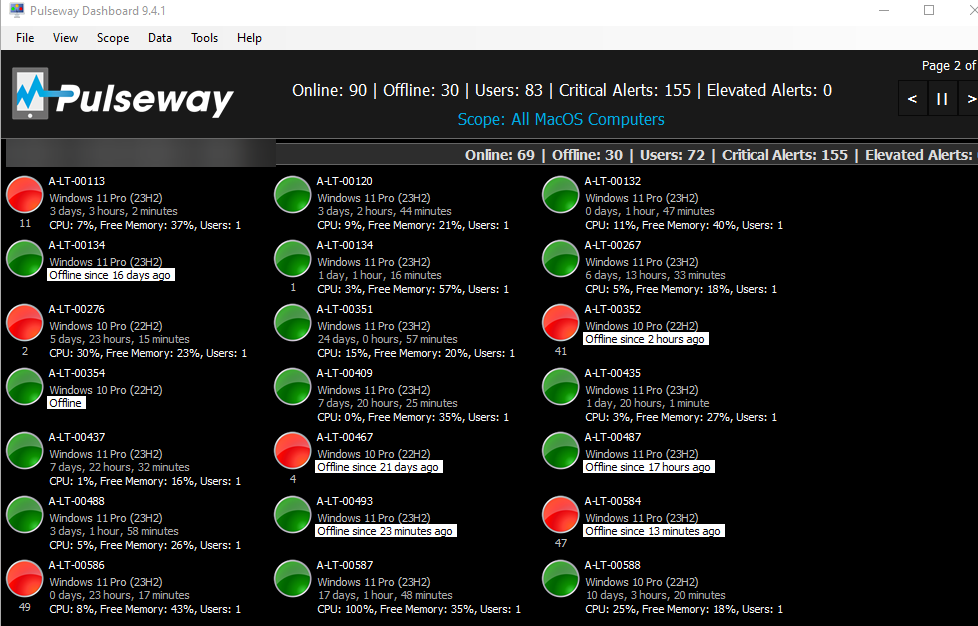
Pulseway is a remote monitoring and endpoint management platform designed with a mobile-first mindset. It enables MSPs and IT teams to monitor, manage, and control systems in real time, directly from their smartphones. Trusted by thousands of users globally, Pulseway is particularly appealing to teams that prioritize flexibility and fast response times, even while on the move.
Key Features
- Provides real-time alerts and live device performance metrics, ensuring instant visibility into system health and issues.
- Its fully functional mobile app gives technicians complete control over devices, allowing them to run scripts, apply patches, and reboot systems remotely.
- Includes scripting automation and patch management capabilities to streamline routine tasks across endpoints.
Pros
- Pulseway offers one of the best mobile experiences in the RMM space, making it ideal for technicians who are frequently on the go.
- The platform is quick to deploy and intuitive to operate, even for smaller teams with limited IT resources.
- It’s priced competitively, making it a budget-friendly choice for startups and smaller MSPs.
Cons
- The web interface feels outdated and lacks the polish seen in more modern platforms.
- It supports fewer integrations compared to larger enterprise RMM solutions, which may limit extensibility.
- Reporting tools are somewhat basic and could benefit from deeper customization options.
Pricing
Pulseway offers pricing starting at approximately $22/month per endpoint or $70/month per user, depending on the plan and scale. Discounts are available for larger volumes, and advanced modules like patching or automation may come at an additional cost.
6. ManageEngine OpManager
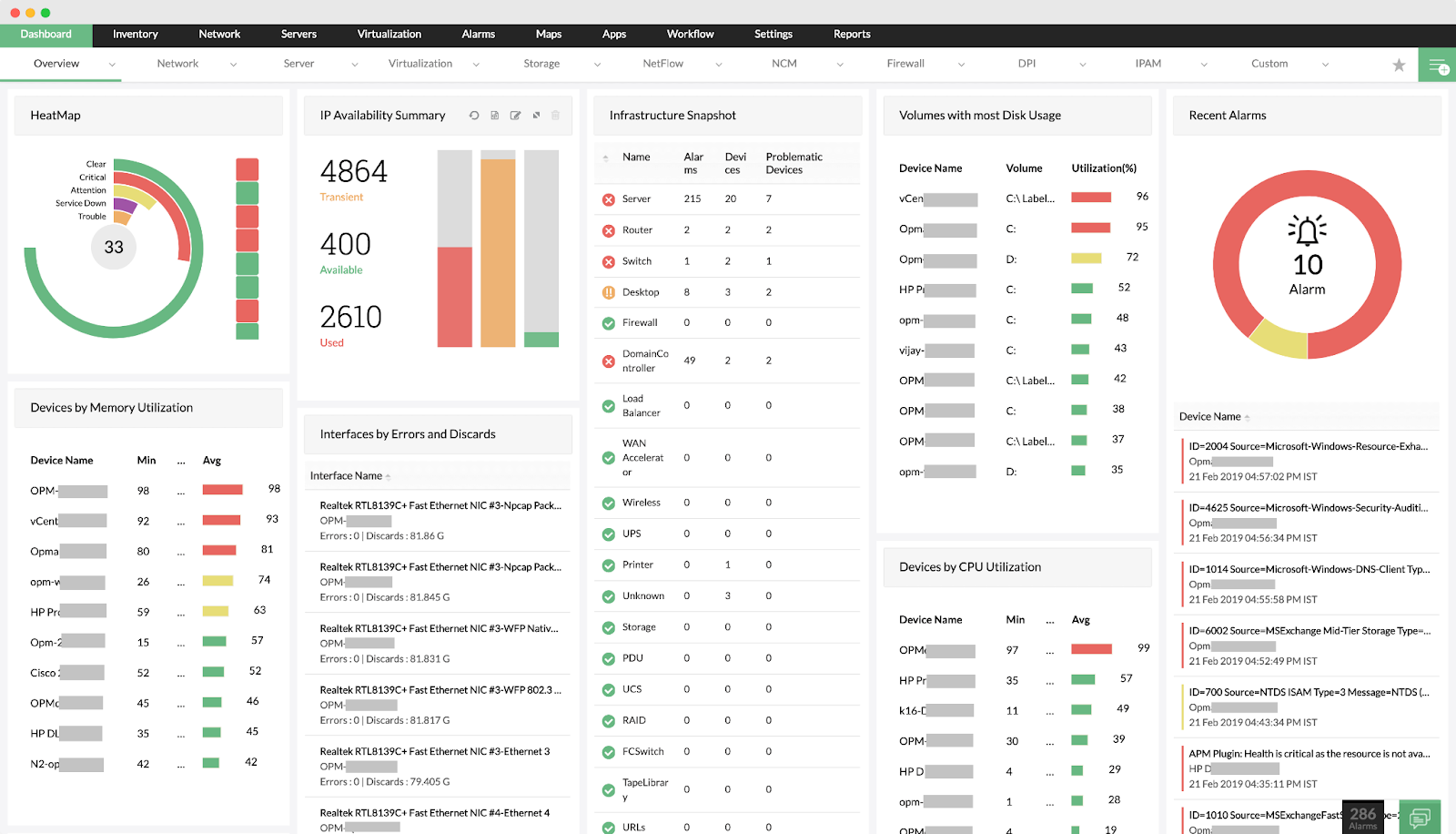
OpManager is a robust network and infrastructure monitoring solution developed by ManageEngine, designed for MSPs and IT teams managing large-scale or multi-site networks. It provides deep visibility into the performance and health of network components, servers, and virtual environments. With its enterprise-grade scalability and diagnostic capabilities, OpManager is ideal for MSPs that specialize in infrastructure-heavy environments.
Key Features
- Offers real-time network performance monitoring, helping teams quickly detect and resolve latency, packet loss, and bandwidth issues.
- Monitors WAN links, physical and virtual servers, and hypervisors, providing comprehensive infrastructure oversight.
- Includes customizable dashboards and flexible alert workflows, allowing MSPs to tailor monitoring to client-specific SLAs.
Pros
- Delivers a rich set of features for in-depth network diagnostics and fault management.
- Scales effortlessly to support large infrastructures and distributed network environments.
- Compatible with a wide range of devices and network protocols, enhancing flexibility for complex deployments.
Cons
- While powerful for network monitoring, OpManager lacks full RMM and PSA capabilities, making it less ideal as a standalone MSP management suite.
- Initial setup and configuration require networking expertise, which may slow onboarding for smaller teams.
- The user interface, though feature-rich, can feel overwhelming or complex for those new to network tools.
Pricing
OpManager’s pricing starts at around $245 for 10 devices (perpetual license), with higher tiers depending on the number of devices and advanced features. MSP-specific editions and enterprise licenses are available upon request, often requiring a customized quote.
7. Syncro
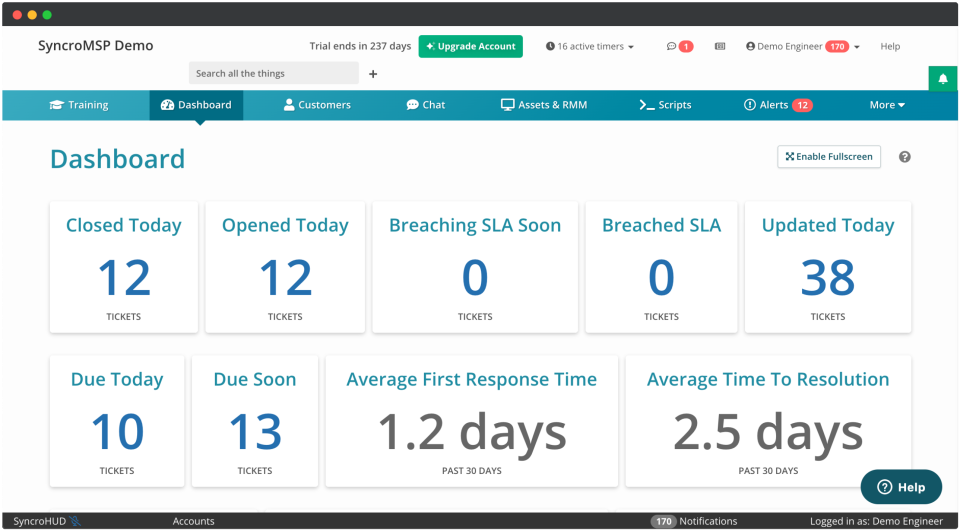
Syncro is an all-in-one PSA and RMM platform tailored for small to mid-sized MSPs seeking an affordable yet capable solution. By combining support ticketing, billing, automation, and remote access into a single, easy-to-use interface, Syncro helps MSPs streamline operations without the steep learning curve or high costs of legacy platforms. It’s particularly popular among new or growing service providers.
Key Features
- Syncro includes built-in ticketing, invoicing, and time tracking, simplifying service management and financial workflows in one place.
- Offers reliable remote access with scripting capabilities and automation tools, enabling efficient endpoint management.
- Provides customizable customer portals that enhance transparency and communication with clients.
Pros
- Delivers excellent value for money, making it ideal for MSPs working within tight budgets.
- The interface is clean and intuitive, which is especially helpful for first-time users transitioning to PSA/RMM tools.
- Syncro consistently rolls out feature updates based on user community feedback, showing strong product evolution.
Cons
- The platform has a relatively smaller integration library compared to more established competitors.
- It lacks advanced network monitoring capabilities, which may limit its usefulness in infrastructure-heavy environments.
- Some advanced features are under-documented, potentially requiring trial and error or community support to implement.
Pricing
Syncro offers transparent, flat-rate pricing at $129 per technician/month, which includes unlimited endpoints and access to all core features. There are no hidden fees, and discounts are available for annual commitments.
8. HaloPSA
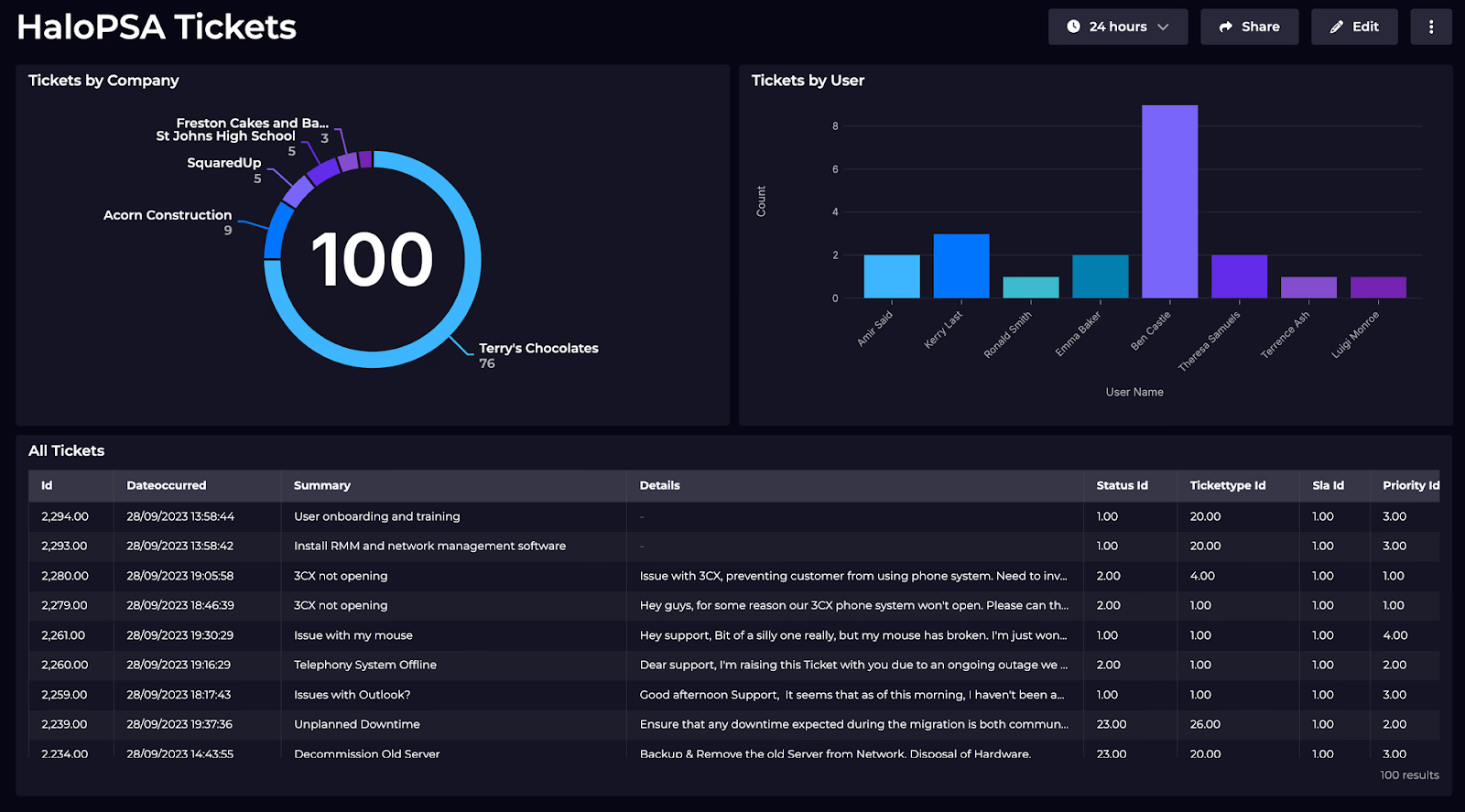
HaloPSA is a next-generation Professional Services Automation (PSA) platform designed for modern MSPs looking to escape the limitations of legacy tools. It offers a full-featured service desk, project management, and billing system—wrapped in a sleek, user-friendly interface. With deep customization options and growing integration support, HaloPSA is quickly becoming a preferred choice for agile, service-focused IT teams.
Key Features
- Combines project management, helpdesk, and time tracking into a unified platform, supporting efficient service delivery and resource planning.
- Offers dynamic SLA policies, ticket escalation rules, and workflow automations to ensure timely client support.
- Integrates with popular RMM tools and financial software, enabling seamless ticketing, billing, and IT operations.
Pros
- Highly configurable platform allows MSPs to tailor workflows, forms, and automations to match unique business processes.
- Boasts a clean, modern interface that enhances user experience and reduces onboarding time.
- Competitive and transparent pricing makes it accessible for smaller MSPs or those switching from more expensive tools.
Cons
- Lacks native RMM functionality, requiring integration with third-party solutions for complete endpoint management.
- Has a smaller user community and support network compared to long-established PSA platforms.
- Advanced reporting and dashboards may require some manual configuration to meet custom requirements.
Pricing
HaloPSA offers pricing starting at approximately $29/user/month for the Standard plan, with higher tiers unlocking advanced features. All plans come with unlimited tickets, clients, and projects, making it a budget-friendly option for growing MSPs.
9. Jira Service Management
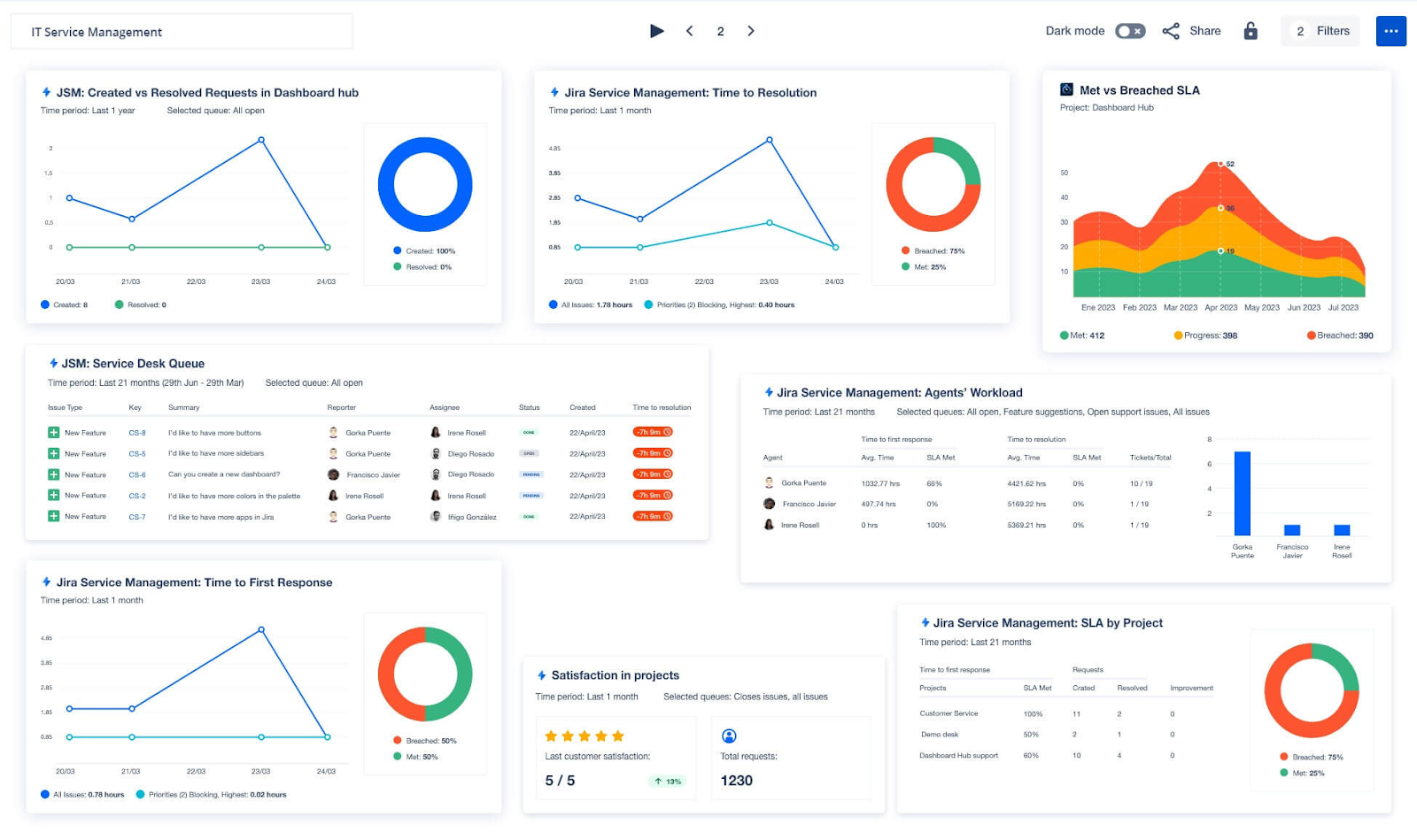
Developed by Atlassian, Jira Service Management is a robust IT Service Management (ITSM) platform that brings together agile workflows, incident resolution, and DevOps collaboration. It’s particularly well-suited for MSPs that support software development teams or internal IT departments seeking tighter integration with development pipelines. The platform leverages Atlassian’s broader ecosystem to deliver a unified, scalable service experience.
Key Features
- Offers comprehensive ITIL-based capabilities, including incident, change, and problem management, to standardize and improve service delivery.
- Seamlessly integrates with other Atlassian products like Confluence (for documentation) and Bitbucket (for DevOps), enhancing cross-functional collaboration.
- Supports customizable workflows and automation rules, allowing teams to align service processes with agile methodologies.
Pros
- A top-tier choice for agile IT teams thanks to its flexibility and native support for DevOps practices.
- Highly scalable within the Atlassian ecosystem, making it easy to expand as needs grow across IT and development.
- Excellent knowledge base integration via Confluence, with powerful documentation and self-service support features.
Cons
- Requires considerable customization to fully meet traditional MSP requirements, especially around ticket handling and client billing.
- The platform has a moderate learning curve for users unfamiliar with Atlassian products or agile frameworks.
- Lacks built-in RMM and endpoint management, requiring third-party tools for full MSP functionality.
Pricing
Jira Service Management pricing starts at $21/user/month (Standard plan) and scales up to $47/user/month for the Premium plan. A free tier is also available for small teams, and enterprise plans offer additional security, compliance, and customization options.
10. Acronis Cyber Backup
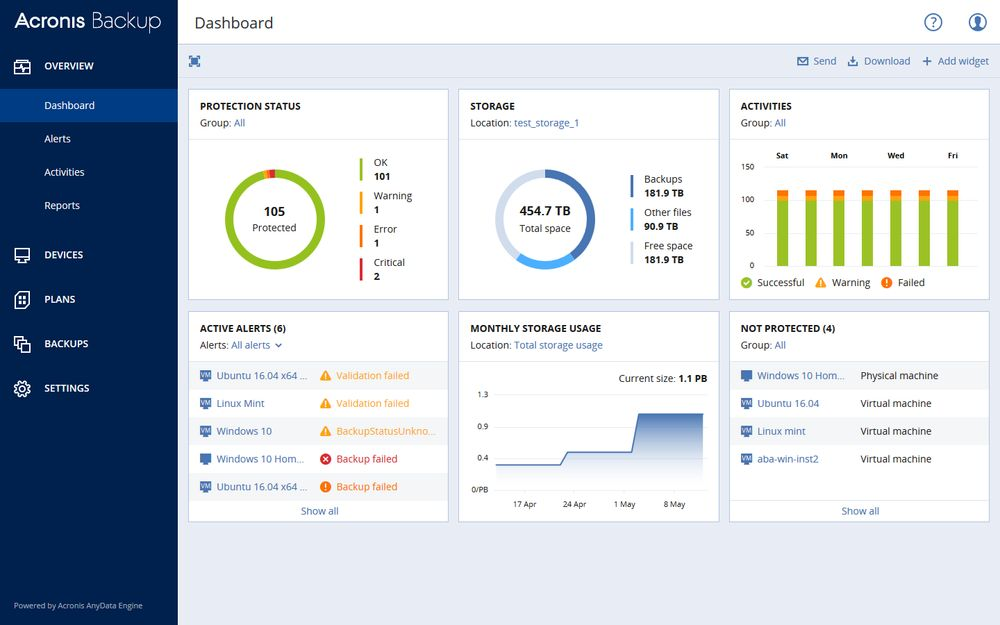
Acronis is a trusted leader in backup, disaster recovery, and cybersecurity, offering a unified platform tailored for MSPs delivering managed data protection services.
Acronis Cyber Protect Cloud combines backup, anti-malware, patch management, and vulnerability assessments, making it a powerful solution for safeguarding client data across endpoints, servers, and virtual machines.
Key Features
- Provides secure and reliable backup and recovery for servers, virtual machines, and endpoints, ensuring business continuity in the event of data loss or failure.
- Features AI-based anti-ransomware protection that proactively detects and blocks malicious behaviors before they cause damage.
- Offers centralized management, reporting, and deployment, enabling MSPs to monitor multiple clients and locations from a single interface.
Pros
- Acronis has a long-standing reputation for backup reliability and data integrity, earning trust across industries.
- The platform goes beyond backup by bundling in cybersecurity, offering built-in anti-malware and patching for a layered defense.
- Supports flexible storage options—including local, hybrid, and Acronis Cloud—allowing MSPs to tailor solutions based on client needs.
Cons
- The interface can be complex for first-time users due to the breadth of features and configurations.
- While powerful in data protection, Acronis is not a full PSA or RMM platform, so MSPs may need to integrate it with other tools.
- Pricing can become expensive as you scale to support more endpoints or advanced features like forensics or advanced threat detection.
Pricing
Acronis Cyber Protect Cloud uses a usage-based pricing model, typically charged per device or per GB of storage. Backup-only licenses start at a low monthly rate, but advanced features (like cybersecurity or DR) are priced separately. Custom quotes are available based on your MSP’s size and service needs.
11. Freshservice
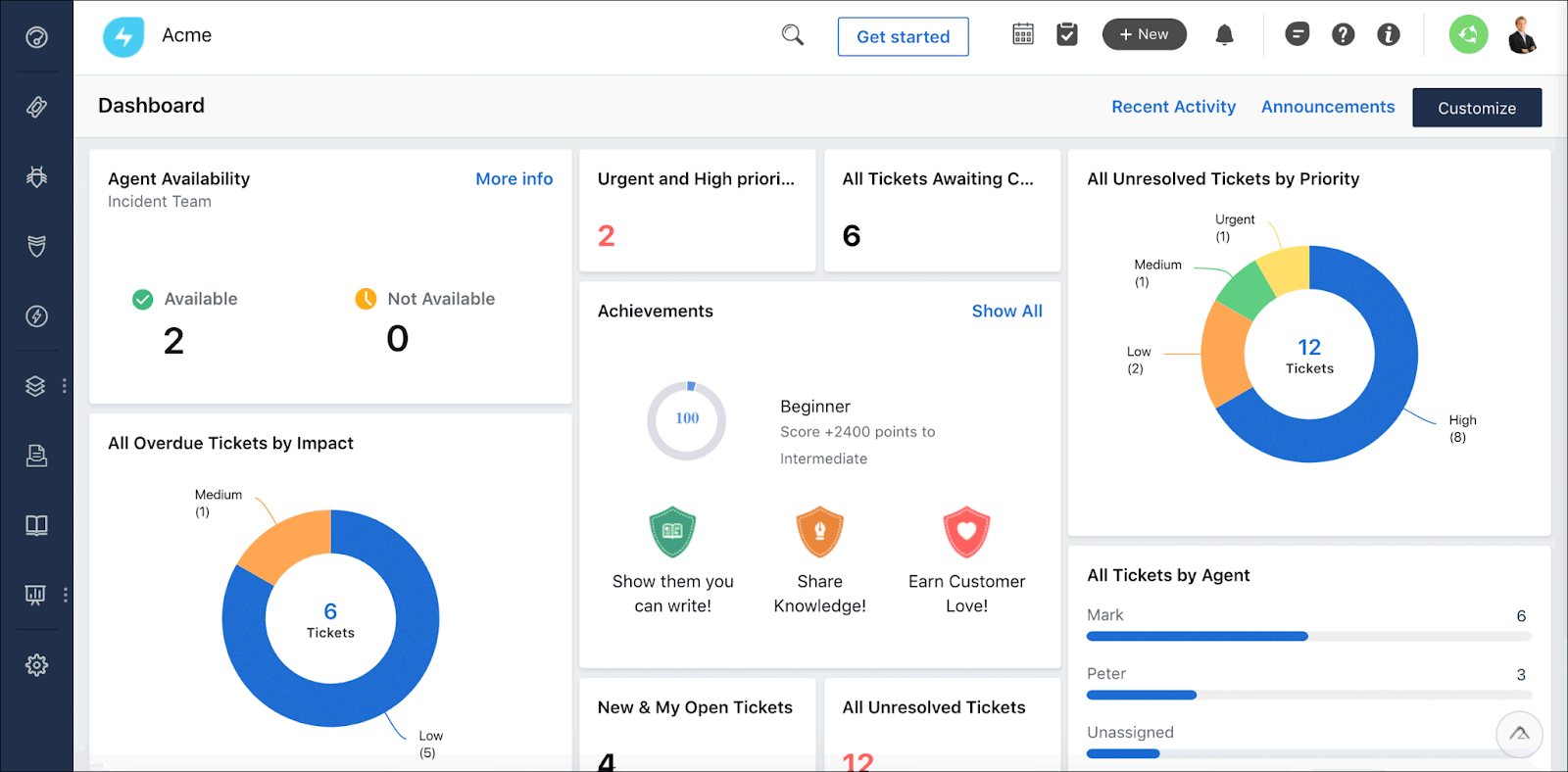
Freshservice is a cloud-based IT Service Management (ITSM) platform designed for ease of use, rapid deployment, and intelligent automation. Built with modern service teams in mind, it's particularly well-suited for MSPs focused on delivering high-quality support through streamlined ticketing, workflow automation, and SLA management. The platform is known for its intuitive UI and strong emphasis on user experience.
Key Features
- Offers comprehensive ITSM modules including incident, asset, change, and problem management, enhanced by AI-powered automation to reduce manual effort.
- Supports service catalog creation and SLA enforcement, helping MSPs deliver consistent service across clients.
- Comes with an integrated knowledge base, analytics dashboards, and workflow orchestration tools for proactive service delivery.
Pros
- The sleek and modern interface improves usability for technicians and end-users alike, reducing training time.
- Easy to deploy and scale across teams, with minimal IT overhead required.
- Backed by excellent customer support and detailed documentation, aiding in smooth onboarding and ongoing optimization.
Cons
- Lacks native RMM functionality, meaning MSPs must rely on external tools for endpoint monitoring and management.
- Some advanced features, such as orchestration and advanced analytics, are only available in higher-tier plans.
- For full MSP functionality, including integrations with billing, remote support, or patching—additional setup and third-party tools are often needed.
Pricing
Freshservice pricing starts at $29/user/month (Starter plan), with popular mid-tier options like the Growth and Pro plans priced at $49 and $95/user/month respectively. Enterprise features, including sandboxing, advanced analytics, and custom modules, are available in the Forest plan at $119/user/month. A 21-day free trial is available for testing.
How to Choose the Right MSP Software
Key Features to Look For
Ensure the software supports automation, remote access, patch management, ticketing, and security, all vital for MSP operations.
Integration Capabilities
The best managed services software should integrate with CRM, billing, endpoint protection, and cloud platforms like AWS or Microsoft Azure.
Scalability and Flexibility
Your chosen tool should scale with your business and allow flexibility in pricing, modules, and workflow customization.
Pricing and ROI Considerations
Look for value, not just low pricing. Evaluate based on the number of endpoints, users, clients, and features included.
Conclusion
Choosing the best managed service provider software is critical for IT teams and MSPs aiming to scale service delivery, optimize costs, and maintain security. From comprehensive platforms like ConnectWise and NinjaOne to SaaS-focused tools like CloudEagle.ai, there’s a solution for every MSP’s unique needs.
Don’t just pick a tool, choose a solution that aligns with your business goals and client expectations. Let these tools do the heavy lifting so you can focus on delivering exceptional value.
FAQs
1. Who is the best MSP?
There isn’t a single “best” MSP, it depends on the services you need. However, top-rated MSPs include companies that use platforms like ConnectWise, Atera, and NinjaOne.
2. What is MSP software?
MSP software helps IT service providers remotely manage client systems, networks, security, and endpoints.
3. What is a managed services provider?
A Managed Services Provider (MSP) delivers outsourced IT services such as infrastructure monitoring, helpdesk support, and cybersecurity.
4. What is the best monitoring for MSP?
NinjaOne, Pulseway, and ManageEngine OpManager are among the best for real-time system and network monitoring.
5. What does a managed service provider do?
An MSP handles ongoing IT services for clients, including monitoring, updates, troubleshooting, and security.
6. What is a MSP in networking?
In networking, an MSP manages routers, switches, firewalls, and other components to ensure uptime and security for client networks.

%201.svg)







.avif)




.avif)
.avif)




.png)
